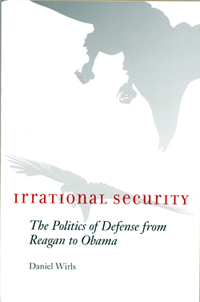In a new book, UC Santa Cruz professor Daniel Wirls writes that the "peace dividend" the nation was supposed to enjoy after the end of the Cold War was hijacked by dysfunctional national security politics that continue to push the defense budget ever higher.
In Irrational Security: The Politics of Defense from Reagan to Obama (Johns Hopkins University Press) Wirls shows how defense spending changed only temporarily after the fall of the Soviet Union, was increasing by the end of the Clinton presidency, and has soared since Sept. 11, 2001 even before counting the cost of wars in Iraq and Afghanistan. "The politics of war hid the Bush build-up in plain sight," Wirls says.
Wirls, chair of the politics department at UC Santa Cruz, writes that the U.S. defense budget climbed 75 percent during the George W. Bush administration, an increase that doesn't include $700 billion spent in Iraq and Afghanistan. The "war on terror" gave Bush the political cover to keep ratcheting up spending, he says. And it didn't make us any safer.
In the 1980s, President Reagan produced the largest peacetime increase in military spending in the nation's history. Then, with the fall of the Berlin Wall, the United States was left as the only super power. The opportunity was set to redirect defense dollars to other domestic priorities.
Wirls acknowledges that some spending was cut during the administrations of George H.W. Bush and Bill Clinton as dozens of military bases around the country were decommissioned and troop levels reduced. But he argues that presidents Bush and Clinton mostly trimmed around the edges, unwilling or unable to fundamentally redefine U.S. defense policy. "I try to show the real continuity of the politics from the end of the Cold War to the War on Terrror," Wirls said, "the inability of the President and Congress, regardless of party, to confront military policy rationally."
The result is a bloated military that has dire implications for national security.
The United States is militarily powerful but "otherwise insecure," Wirls writes.
Today, the budget continues to climb despite Defense Secretary Robert Gates' statements in early May challenging sacrosanct Pentagon spending habits. "The gusher has been turned off, and will stay off for a good period of time," Gates said in a speech at the Eisenhower Library in Abilene, KS. It was former President Eisenhower who famously warned against the growing "military-industrial complex."
Although Wirls' book closes with the election of President Obama, he notes that defense spending continues to grow.
"Gates' attack on bloated military bureaucracy and his claim that the 'gusher' of military spending is over ignores the fact that Obama's first budget increased military spending by 4 percent and his second budget proposes a 3 percent increase in Pentagon spending, both separate from the wars," Wirls said.




